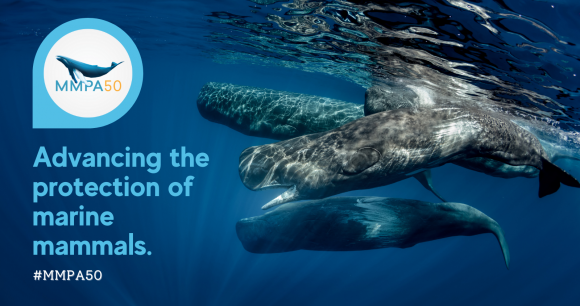
Bedrock environmental law has protected many marine mammals from sliding toward endangerment, extinction
Washington, DC—Today, a coalition of more than 20 animal and environmental protection organizations gathered alongside scientists, agency officials, and legislators to celebrate the 50th anniversary of the US Marine Mammal Protection Act. The MMPA is the first federal law to establish protections for marine mammals, which has enabled many vulnerable populations to recover from the brink of extinction.
Over the last half century, the MMPA has provided vital protections for marine mammals, including humpback whales, California sea lions and Northern elephant seals, who face serious and sustained challenges from entanglement in fishing gear, human-caused ocean noise, habitat degradation, vessel strikes, changing climate, and more.
Dr. Frances Gulland, chair of the Marine Mammal Commission, and U.S. Rep. Jared Huffman (D-CA) were among the speakers at a special reception hosted by the coalition on Capitol Hill Wednesday.
“This law takes a comprehensive, ecosystem-based approach to wildlife management, ensuring that marine mammal populations won’t fall below sustainable levels and will continue to play an important functional role in their habitats, which was groundbreaking at the time,” Huffman said. “Since signing this law into effect, the MMPA has really had some remarkable benefits. Not a single marine mammal protected by this law has gone extinct. We have too many that are teetering right now, but we haven’t lost any patients yet.”
Added Gulland: “Animals that were directly killed for meat, animals that were hunted, animals for which there was a bounty on their head—by protecting them under the MMPA those have recovered.”
Despite these success stories, both Huffman and Gulland cited significant existing threats to marine mammals, including climate change, deep-sea mining, marine contaminants, and noise pollution.
Throughout the week, animal protection and conservation advocates will meet with legislators and staff members to discuss the importance of safeguarding and advancing the MMPA—defending this bedrock environmental law from special interests and ensuring that it can continue to protect marine mammals from current and future threats.
“As we celebrate the MMPA’s 50th anniversary, we will continue to educate the public about this groundbreaking statute and the remarkable animals it protects,” said Allison Ludtke, co-chair of the MMPA Coalition and government affairs policy advisor for the Animal Welfare Institute. “Now more than ever, the MMPA serves as a road map to defend our oceans from relentless industrial threats.”
Inspired by horrific images of dolphins dying in tuna nets, factory ships harpooning great whales, and airplanes and helicopters running down mighty polar bears so sport hunters could shoot them, the MMPA was enacted on October 21, 1972, as a precautionary piece of legislation to protect marine mammals and their ecosystems from unregulated exploitation.
Specifically, the MMPA prohibits the “taking” of any marine mammal without a permit, including hunting, capture, or harassment. It also established a moratorium on the import, export, or sale of marine mammals or marine mammal parts within US borders, among other commonsense provisions.
The vast majority of Americans support the MMPA, according to recent polls, as well as protecting marine mammals from threats associated with offshore oil and gas drilling.
“With their environment changing rapidly as the oceans warm, most marine mammals are facing extraordinary challenges over the next decades,” said Michael Jasny, co-chair of the MMPA Coalition and director of marine mammal protection for NRDC (Natural Resources Defense Council). “We need a strong, well-funded law—undiluted by industry giveaways—if our grandchildren are to know whales and dolphins off our coasts.”
Members of the coalition are: the Animal Welfare Institute; the Center for Biological Diversity; Cetacean Society International; Defenders of Wildlife; the Environmental Investigation Agency; Humane Society Legislative Fund; the Humane Society of the United States; Gotham Whale; Inland Ocean Coalition; IFAW (International Fund for Animal Welfare); the International Marine Mammal Project; Marine Mammal Alliance Nantucket; NRDC (Natural Resources Defense Council); NY4Whales; Oceana; Ocean Alliance; Ocean Conservancy; Ocean Conservation Research; the Oceanic Preservation Society; Save the Manatee; and WDC, Whale and Dolphin Conservation.
In addition to celebrating this milestone, these groups will continue to advocate strengthening the MMPA, recognizing that the law must be dynamic to address the myriad human-caused threats and challenges facing marine mammals over the next 50 years.
“It’s an amazing piece of legislation,” Gulland said. “It has flexibility. It morphs. It lives.”
Marjorie Fishman, Animal Welfare Institute
[email protected], (202) 446-2128
The Animal Welfare Institute (awionline.org) is a nonprofit charitable organization founded in 1951 and dedicated to reducing animal suffering caused by people. AWI engages policymakers, scientists, industry, and the public to achieve better treatment of animals everywhere—in the laboratory, on the farm, in commerce, at home, and in the wild. Follow us on Facebook, Twitter, and Instagram for updates and other important animal protection news.